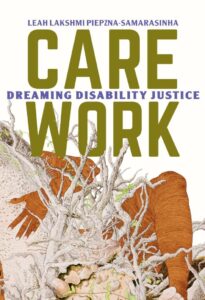Resilience in the Face of Trauma
Introduction
Disability justice is a radical framework that centers the most marginalized disabled people—Black, Indigenous, queer, trans, poor, and immigrant communities—recognizing that ableism is inseparable from white supremacy, capitalism, and colonialism. At its core, this movement redefines carework as essential labor and insists on compassionate management that resists the dehumanizing demands of productivity. Drawing from Sharon Salzberg’s Real Change: Mindfulness to Heal Ourselves and the World, this essay explores how grief and resilience shape disability justice, critiques forced intimacy, and envisions a world built on access intimacy, interdependence, and sustainable activism.
The Disability Community: Diverse and Resilient
The disability community is not monolithic—some embrace the identity, while others resist it. Some are born disabled; others become disabled later in life. Some navigate medical systems for survival, while others reject pathologizing frameworks. Deaf culture, for example, distinguishes between Deaf (a cultural identity) and deaf (an audiological condition). This diversity means there is no single “disabled experience,” yet ableism impacts all who deviate from oppressive norms of productivity and independence.
Medical Model vs. Social Model: A Shift in Perspective
The medical model locates disability within individual bodies, framing it as a problem to be “fixed” by the medical-industrial complex—a profit-driven system that commodifies care. In contrast, the social model identifies barriers—like stairs instead of ramps, or workplaces that refuse flexible schedules—as the true obstacles. Disability justice expands this further, recognizing that access is not just physical but emotional, economic, and cultural.
Ableism and the Plantation Model of Labor
Ableism is a system that values people based on productivity, rooted in anti-Blackness, eugenics, and capitalism. The plantation model exemplifies this: it exploits labor, devalues care, and treats workers as disposable. Under this system, disabled people—particularly those racialized as Black or Brown—are denied autonomy, forced into institutions, or made to prove their worth through exhausting labor.
Carework, often feminized and unpaid, is treated as an obligation rather than valued labor. As Leah Lakshmi Piepzna-Samarasinha writes in Care Work: Dreaming Disability Justice, “Fair trade emotional economics” must replace forced caretaking. Consent, boundaries, and mutual aid—not coercion—should define care.
Forced Intimacy vs. Access Intimacy
Forced intimacy describes how disabled people must disclose personal medical details, endure invasive touch from aides, or perform emotional labor to receive basic access. This is exploitative and exhausting.
In contrast, access intimacy (Mia Mingus) is the deep comfort when someone “just gets” your needs without explanation. It can be instant or cultivated, but it always centers consent and interdependence. Disability justice demands that care be reciprocal, not extractive.
Grief, Resilience, and Sustainable Activism
Sharon Salzberg, in Real Change, writes:
“Resilience is something that accretes over time as we develop a habit of courageously responding to or being with pain without freaking out. At some times you notice you bend but don’t break.”
Disability justice work is inherently tied to grief—grief over lost access, institutional violence, and the constant fight for survival. Yet, as Salzberg reminds us, resilience is not about rigidity—it’s about the capacity to bend without breaking.
“In working to make change in the world there will always be setbacks. We have to be able to bounce back… If you come at an effort to change with great rigidity, then any challenge feels like the end of the story and you’re sunk.”
This wisdom aligns with disability justice’s call for flexibility, rest, and collective care. The movement understands that burnout is not a personal failure but a systemic one.
Cross-Movement Solidarity and Healing Justice
Disability justice cannot exist in isolation. It must align with racial justice, prison abolition, queer/trans liberation, and environmental justice. The 1977 Section 504 sit-ins, supported by the Black Panthers, exemplify this solidarity. Today, we must continue building movements that:
- Reject single-issue activism
- Center marginalized disabled voices
- Integrate healing justice—rituals, grief work, and trauma-informed care—into organizing
As Piepzna-Samarasinha writes:
“Although containing and denying grief is a time-honored activist practice… feelings of grief and trauma are not a distraction from the struggle.”
A Future of Interdependence and Resilience
Disability justice offers a radical reimagining of care—one where no one is disposable, where access is a collective responsibility, and where compassion is foundational. By dismantling ableism, capitalism, and supremacy culture, we can create a world where:
- Carework is honored, not exploited
- Forced intimacy is replaced with consent-based access intimacy
- Grief is acknowledged as part of the struggle, not a weakness
- Resilience is cultivated through flexibility, not rigidity
Key Principles for Moving Forward:
- Center the most marginalized—disabled BIPOC, queer/trans folks, and poor communities.
- Reject productivity as worth—value rest, slowness, and different ways of being.
- Build access intimacy—prioritize consent, mutual aid, and understanding.
- Practice cross-movement solidarity—fight ableism alongside racism, colonialism, and queerphobia.
- Honor grief and cultivate resilience—as Salzberg teaches, resilience is bending without breaking.
Disability justice is not just about rights—it’s about liberation. And liberation must be tender, interdependent, and deeply compassionate.
Sources:
- Sins Invalid, Principles of Disability Justice
- Mia Mingus, Access Intimacy and Forced Intimacy
- Leah Lakshmi Piepzna-Samarasinha, Care Work: Dreaming Disability Justice
- Sharon Salzberg, Real Change: Mindfulness to Heal Ourselves and the World
- Talila “TL” Lewis, Ableism: A Working Definition
- ADAPT and Section 504 Histories

